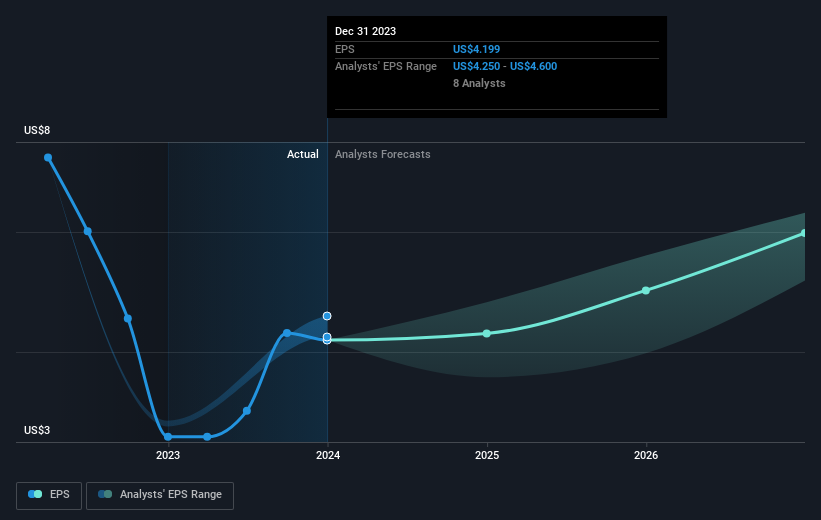Intercontinental Exchange's (NYSE:ICE) earnings growth rate lags the 12% CAGR delivered to shareholders
The main point of investing for the long term is to make money. Furthermore, you'd generally like to see the share price rise faster than the market. But Intercontinental Exchange, Inc. (NYSE:ICE) has fallen short of that second goal, with a share price rise of 62% over five years, which is below the market return. Some buyers are laughing, though, with an increase of 21% in the last year.
In light of the stock dropping 4.6% in the past week, we want to investigate the longer term story, and see if fundamentals have been the driver of the company's positive five-year return.
Check out our latest analysis for Intercontinental Exchange
To paraphrase Benjamin Graham: Over the short term the market is a voting machine, but over the long term it's a weighing machine. One flawed but reasonable way to assess how sentiment around a company has changed is to compare the earnings per share (EPS) with the share price.
Over half a decade, Intercontinental Exchange managed to grow its earnings per share at 3.6% a year. This EPS growth is lower than the 10% average annual increase in the share price. So it's fair to assume the market has a higher opinion of the business than it did five years ago. And that's hardly shocking given the track record of growth.
The company's earnings per share (over time) is depicted in the image below (click to see the exact numbers).
We know that Intercontinental Exchange has improved its bottom line lately, but is it going to grow revenue? Check if analysts think Intercontinental Exchange will grow revenue in the future.
What About Dividends?
When looking at investment returns, it is important to consider the difference between total shareholder return (TSR) and share price return. The TSR incorporates the value of any spin-offs or discounted capital raisings, along with any dividends, based on the assumption that the dividends are reinvested. It's fair to say that the TSR gives a more complete picture for stocks that pay a dividend. In the case of Intercontinental Exchange, it has a TSR of 73% for the last 5 years. That exceeds its share price return that we previously mentioned. The dividends paid by the company have thusly boosted the total shareholder return.
A Different Perspective
Intercontinental Exchange's TSR for the year was broadly in line with the market average, at 23%. That gain looks pretty satisfying, and it is even better than the five-year TSR of 12% per year. Even if the share price growth slows down from here, there's a good chance that this is business worth watching in the long term. It's always interesting to track share price performance over the longer term. But to understand Intercontinental Exchange better, we need to consider many other factors. To that end, you should learn about the 2 warning signs we've spotted with Intercontinental Exchange (including 1 which is a bit unpleasant) .
But note: Intercontinental Exchange may not be the best stock to buy. So take a peek at this free list of interesting companies with past earnings growth (and further growth forecast).
Please note, the market returns quoted in this article reflect the market weighted average returns of stocks that currently trade on American exchanges.
Have feedback on this article? Concerned about the content? Get in touch with us directly. Alternatively, email editorial-team (at) simplywallst.com.
This article by Simply Wall St is general in nature. We provide commentary based on historical data and analyst forecasts only using an unbiased methodology and our articles are not intended to be financial advice. It does not constitute a recommendation to buy or sell any stock, and does not take account of your objectives, or your financial situation. We aim to bring you long-term focused analysis driven by fundamental data. Note that our analysis may not factor in the latest price-sensitive company announcements or qualitative material. Simply Wall St has no position in any stocks mentioned.

